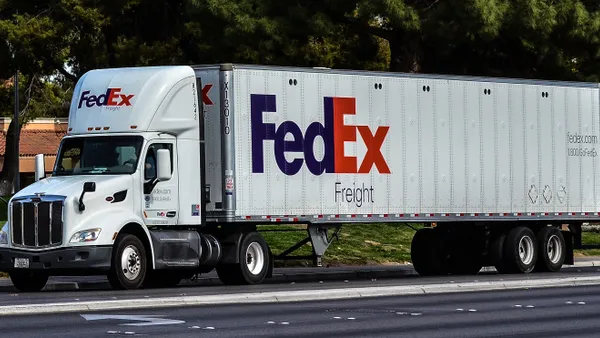Dive Brief:
- UPS has agreed to buy 170 million gallon equivalents of renewable natural gas (RNG) from Clean Energy Fuels through 2026, in what the logistics company called "the largest commitment for use of RNG to date by any company in the United States."
- UPS plans to use between 22.5 and 25 million gallon equivalents of RNG per year. It already has a fleet of 6,100 CNG and LNG vehicles that can run on this fuel stationed across nine countries, UPS said.
- "We’re pleased to be able to fulfill the growing demand for RNG as more fleets seek a clean, economical alternative," Tyler Henn, the vice president and general manager of Clean Energy Renewables, a division of Clean Energy, said in the press release.
Dive Insight:
This purchase agreement is the next step in UPS' investment in an RNG pipeline. In 2017, it entered a five-year agreement with AMP Americas for 1.5 million gallons of RNG per year from the Fair Oaks dairy farm in Indiana, and an up to 10-million-gallon per year purchase from Big Ox Energy that runs through 2024.
"The Big Ox agreement is our largest investment in RNG to date, as well as one of the largest in the RNG market overall," UPS wrote in its 2017 sustainability report. "In 2017, UPS used over 15 million gallons of RNG in our fleet."
The company said the use of this fuel is an important step toward reducing its greenhouse gas (GHG) emissions. Its goal is to have 40% of its ground transportation powered by sources other than conventional gas and diesel by 2025. In 2017, this number was 21.8%.
"Since RNG is supported by existing national infrastructure used to transport natural gas, it’s a winning solution that will help UPS to reach our ambitious sustainability goals," Mike Casteel, UPS director of fleet procurement, said in a statement. "At the same time, we hope our unprecedented seven-year commitment serves as a catalyst for wider adoption of RNG by other companies."
Fuel efficiency is also a concern for FedEx, which plans to reduce its carbon footprint from fuel through a variety of measures, including the use of liquefied natural gas (LNG), compressed natural gas (CNG), propane and fuel cells, according to its most recent sustainability report. FedEx's goal is to increase fuel efficiency by 50% by 2025, compared to a 2005 baseline.
UPS and FedEx are looking into other, non-fuel, related sustainability solutions like route optimization and fully-electric alternatives. Both 3PLs have also been significantly more open about their current emissions than Amazon, which is the largest company that does not participate in the Carbon Disclosure Project.














